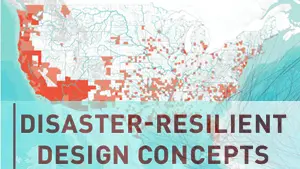 The potential for disaster increases as communities expand into hazard-prone areas and climate change alters the frequency, severity, and locations of threats. The disaster-resilient designs showcased in this document can help communities reduce the impact of disasters, recover more quickly, strengthen local economies, and create safer, more equitable places to live by reducing hazards especially for those most vulnerable. The document is organized by hazard type:
The potential for disaster increases as communities expand into hazard-prone areas and climate change alters the frequency, severity, and locations of threats. The disaster-resilient designs showcased in this document can help communities reduce the impact of disasters, recover more quickly, strengthen local economies, and create safer, more equitable places to live by reducing hazards especially for those most vulnerable. The document is organized by hazard type:
- Wildfire
- Hurricane and Coastal Flooding
- Inland and Riverine Flooding
- Extreme Heat
- Drought
- Landslide and Mudslide
- Tornado and Earthquake
This engaging, easily accessible resource complements more detailed policy guides and planning resources in the links included. The design solutions are offered to inspire a range of stakeholders to come together and invest in projects and infrastructure, to achieve multiple benefits. In addition to sparking awareness among community stakeholders, this document can bridge a larger discussion with emergency managers, land use planners, utility managers, forestry and parks departments, watershed managers, and community-based organizations.
Ten years of place-based technical assistance provided to communities through EPA’s Greening America’s Communities (GAC) program informed this publication. The GAC projects included support from partners from EPA’s Office of Water and Office of Air and Radiation and from FEMA, USDOT, HUD, and NOAA and a range of local, regional, tribal, and state partners who come together to create schematic designs and green infrastructure solutions that protect the environment, economy, and public health, and simultaneously address natural hazards and community benefits.
Through the GAC process, EPA learned that, to be successful, place-based project designs must be created using the best-available science and incorporate meaningful engagement with the communities they are intended to protect and benefit. These design concepts can be the starting point for communities to begin their own process to create a more resilient and thriving future in the face of more frequent and increasingly severe disaster events.
Click here to view the resource.




